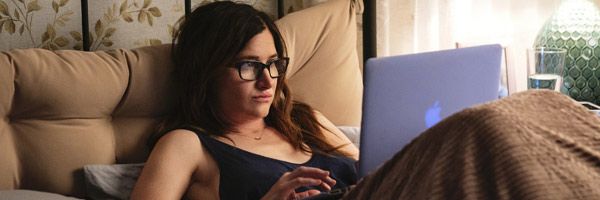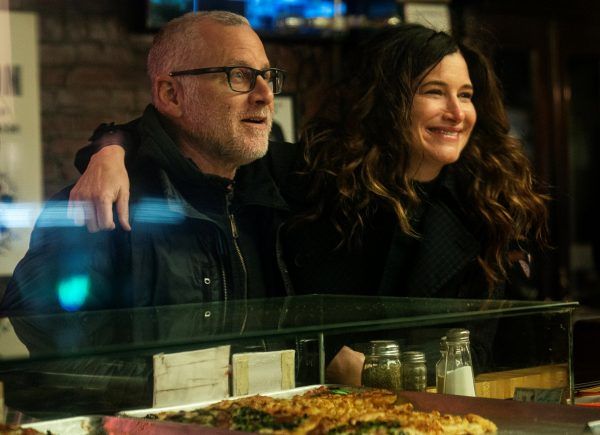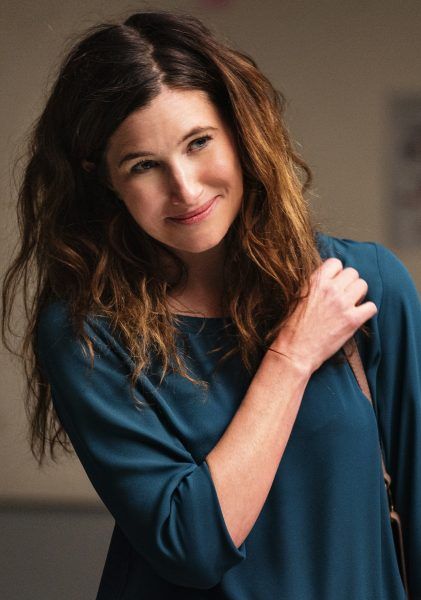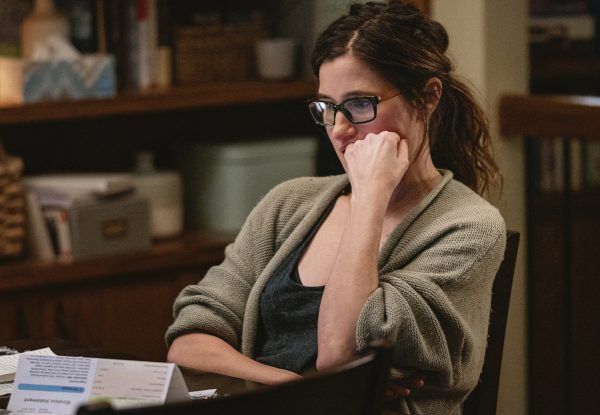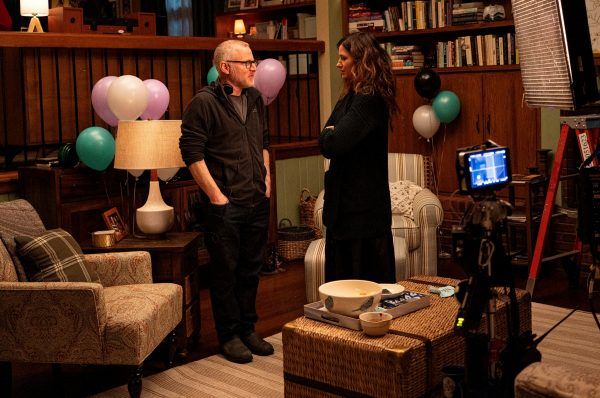From show creator Tom Perrotta (who also wrote the novel of the same name that the series is based on), the HBO seven-episode limited series Mrs. Fletcher is a dual coming-of-age story chronicling the personal and sexual journeys of empty-nest mother Eve Fletcher (Kathryn Hahn, in a stand-out performance) and her popular-jock-turned-college-freshman son, Brendan (Jackson White). They both embrace their newfound freedom in different ways, with Eve learning what it means to be a mid-40s single mom and Brendan learning that adulthood is a bit more complicated than he expected.
Collider recently got the opportunity to sit down with showrunner/writer/executive producer Tom Perrotta in the restaurant at the London Hotel in West Hollywood to chat 1-on-1 about the process of transitioning from author to TV showrunner, the women at the center of his stories, why he intentionally wanted to bring a female point of view into this TV series, through its writers’ room and the directors of the episodes, having an intimacy consultant on set, what it was like to watch an actor the caliber of Kathryn Hahn bringing his character to life and making it her own, and why this became such a tightly written series. He also talked about how he views The Leftovers (for which he also wrote the novel and worked on the series), as a whole, and the way he sees the finale.
Collider: You’ve had a few of your novels turned into projects for film or TV, and you’ve become more and more involved with them. With Election, you handed that over to Alexander Payne. And then, with Little Children, you were involved with the script. By the time The Leftovers came about, you were more heavily involved, as a collaborator. And now, with Mrs. Fletcher, you’re the guy in charge. What’s that whole process been like, going from turning over a book like Election to a filmmaker and seeing what somebody else does with it, to now being so heavily involved?
TOM PERROTTA: I think I had such a great luck with Election that I could have sat back and just tried to replicate that, but I got so interested in the process and I just wanted to be part of the team. That was my original feeling, and it’s been a slow learning process and evolution, where I’ve become more and more comfortable with different aspects of it. To me, what was new about Mrs. Fletcher was that I had to be in the editing room and have the final cut of what the show was. Even on The Leftovers, where I was a producer and very involved in the writing process, I wasn’t in the editing room in a regular way, but I watched (showrunner) Damon [Lindelof] and I learned from him there. It really felt to me like, “Oh, now I’m fully involved in the filmmaking process,” which was great.
When you did Election, is that what you thought it would always be, as far as turning your material over to somebody else, and then seeing the finished product later, or was there always the desire to get more involved?
PERROTTA: I was a huge film buff, and I love movies and film studies, but I really thought of prose fiction writing and screenwriting as very different skills. The idea of a Hollywood screenwriter felt like it had very little, or not as much, creative autonomy as I was used to. And what changed was that indie revolution of the ‘90s, where all of these auteurs that were roughly my age were starting to make movies that felt really personal and felt the expressions of really unique artistic sensibilities. They were writing them and they were directing them. I saw something like Do the Right Thing and thought it was one of the most interesting stories that I’d ever encountered, that was written and filmed, and it felt so much like it was Spike Lee’s unique sensibility. And Election had that quality for me, as well, as did David O. Russell’s films and Nicole Holofcener’s films. That made me feel like there was this space in Hollywood for people who wanna tell stories like I wanna tell. That was an entry point. And then, what happened was that the indie film world ran out of steam, but it shifted into TV, and that was even more writer friendly because it the writer is the creative visionary for the show. And so, it was evolution in me, but also opportunities becoming available in TV and film that hadn’t been there before.
When you originally conceived of this story, what was it that led you to tell the story of a middle-aged woman, trying to find herself again? What brought that character out of you?
PERROTTA: I will say that Mrs. Fletcher feels, to me, like the third book in a trilogy about women and motherhood and work in sex, with Little Children, The Abstinence Teacher, and Mrs. Fletcher. It’s something that I’ve been really interested in, which comes out of the fact that I went to college in the early ‘80s, and it was with the first generation of women who had been potentially raised by feminist mothers and had grown up with feminist values, and thought, “I can do anything a man can do. I can run for president. We can redefine the family.” And they grew up with legalized abortion. It’s been a rocky thing where, in some ways, that vision is true. For certain people, it might be true, but in the end, gender roles have been a little more stubbornly resistant to change than we might like. But I do feel like women of my generation have had to improvise their lives, under a set of circumstances that didn’t exist before, and that’s just been really interesting to watch. I feel like those stories have been fascinating to me, and those are the stories that I’ve been trying to write.
When you decided to then translate Mrs. Fletcher from book to TV show, was it an intentional choice to have a mostly female writers’ room and all female directors? Did you really want to make sure that those female voices were also heard?
PERROTTA: Yes, and that was so much in the air, when we started to make this show. It was right at the height of #MeToo. It was about sexual misbehavior in the workplace, but also about the workplace itself and how it was structured, what kind of opportunities were available to women, and whether their voices would be heard. That was on all of our minds when we started. It isn’t just artistically questionable to have a man telling a woman’s story, which I admit I did, but I also told the story of a teenage boy who’s different from me. That’s what novelists do. You have to tell whatever you can tell, on your own. By definition, one voice tells the story. But a TV show can be collaborative, and it just felt really important, artistically and ethically, to have a lot of women’s voices. I will say that a lot of women’s voices didn’t turn out to be one monolithic woman’s voice. The women argued amongst themselves as heatedly as anybody else, and that was instructive for me. Sometimes that is an illusion in identity politics, that there is a monolithic voice, from this group or that group. It’s more like all of those voices need to be free to argue. That’s really the utopia. Utopia is a bunch of people talking at each other and with each other.
What was the process of deciding on directors for this, and having Nicole Holofcener direct the first episode?
PERROTTA: Nicole was my first choice, mainly based on the fact that I’d loved Enough Said so much, and that was a movie about like a woman in mid-life, trying to find love and romance and sexual fulfillment. She was so tender and funny, and that was the emotional zone that this was gonna exist in. She’s just somebody whose work I’ve admired, from the beginning, so that was an easy choice. I loved Gillian Robespierre’s Obvious Child. But really, what it was with all of the directors was that the book and the show tended to inspire really good conversations because it touches on so many issues that mean a lot to people. So, when we would talk to somebody, if we could find our way to a really interesting conversation about the material, I knew that they were really engaged in it. It was partly based on people’s work and reputation, but it was also more like, are they a part of this big conversation, that is this show? It turned out to be a really good vetting method.
There is a lot of interesting subject matter in Mrs. Fletcher. It explores pornography, but not with judgment and instead as a tool. And with the nudity in it, it’s explored as intimacy and a personal connection, and not just for sex’s sake.
PERROTTA: Yeah. One of the things all of the women involved with the show agreed on was that they didn’t want this show to be titillating for male viewers. It’s a sexy show, in some ways, and it’s about people’s sexual lives, but the way it was shot, it was always about Eve and what was happening to her, and not about the experience of the typical male viewer, hoping to be turned on by that.
And even with the son, you see the affect that porn has had on his perception of women and how he treats women, and you also see that perception challenged.
PERROTTA: Yeah. In some broad way, the show is about the clash between this high-minded culture that is very much centered in universities about consent, sexual equality, expanded ideas of sexuality, creating a more ethical sexual culture, and how the chaotic underworld of porn is also structuring people’s erotic imaginations. Those things are in conflict, and the show is really just trying to explore that dilemma of, here’s the porn world saying, “Go get it,” and here’s the world where feminists and their allies are saying, “Hey, wait a second, sex is only ethical under these rules.”
Now that HBO has the policy of hiring intimacy consultants, what was it like to add that to the mix?
PERROTTA: That helped immensely, and really did protect us from that part where a male producer is going, “Here’s how you should have sex.” I was able to step back and just say, “Okay, in this scene, Eve is watching spanking porn, and she decides to spank herself.” If you read the script, it’s a paragraph. The first time, she doesn’t hit that hard, and it’s nothing. The second time is a little harder and she’s like, “Whoa, that’s interesting.” And the third time, she goes, “Ouch!” That was all that was there. And then, Kathryn went onto the set, the set was closed, and she talked to the intimacy coordinator and director, and out came this amazing improvised scene, where she was playing both roles in a fantasy game, and it was really something. It was very surprising to me to see what they came up with. Because there was this protected space, Kathryn felt like she could explore. That was also actually very helpful in the Episode 6 assault scene. I don’t want to spoil it, but that was a very painful scene for the actors to do, and the intimacy coordinator made it about physical choreography, so that the actors knew exactly what was happening, and that allowed them to act it. It was still really hard for them ‘cause it such an ugly scene.
You live with these characters for awhile, writing a novel and then bringing them to life, on screen. What’s it like to see the work of someone like Kathryn Hahn, who I feel has been criminally under appreciated, for many years?
PERROTTA: Oh, my God, it’s amazing. I feel like I’ve been very lucky in that way, to see what Reese Witherspoon did with Tracy Flick (in Election), or what Carrie Coon did with Nora Durst (in The Leftovers), or what Kate Winslet did with Sarah in Little Children. There’s just something about watching an actor make a character their own, and sometimes creating an iconic character, in the process, and I really do think Mrs. Fletcher is an iconic character ‘cause Kathryn is so great. You’re right about her being criminally underrated. She’s just so watchable, I can’t take my eyes off of her.
Now that time has passed, do you view The Leftovers any differently, as a complete TV series?
PERROTTA: Because the ending is so great, I just feel like we did it justice. I don’t have that feeling like the Game of Thrones people now going, “I wish I’d stuck that landing.” We don’t feel that way. We feel like we brought that story, as far as it could go. I only reflect on it with a feeling of pride and accomplishment. Every now and then, I visit the Reddit site where the super fans talk about it, and it’s very pleasant. People are still discovering it and talking about it, with a very particular passion. It was never for everybody, but the people who love it, love it, and that’s really gratifying. That idea of a show provoking conversation is really the point, right? A community discussion of a story is why we make these things.
How did you interpret the end of the series? Do you feel that Nora was telling the truth, or does it not matter if she was actually telling the truth?
PERROTTA: I’m closer to that school of it. We became more and more conscious of the idea that what we were really doing in The Leftovers was talking about how religion emerges from mystery, and every religion has some story that cannot be verified, that they’re asking you to take on faith. The idea that the show, itself, put its viewers into that position of asking whether you have faith in Nora is the more important question than, is Nora telling the truth? I’d rather focus on the faith part of it then the truth part of it. Like in a lot of those stories, so much is left out. Are you a skeptical person who says, “Wait a second, they rebuilt the machine on the other side?” It’s a hard story to believe. If you wanna believe it, you’re better off not putting it to a scientific test of logic.
What do you want to do next? Do you want to keep working in TV and film, or are novels still in first position for you?
PERROTTA: That’s traditionally been the case, yeah. I’ve been able to have it both ways. TV makes it a little harder to have it both ways because, if your show goes on for multiple years, it’s really hard to have the consistency of focus that you need to write a novel. So, that’s the question for me, right now.
Did you always know that Mrs. Fletcher would just be one season of a show, with 30-minute episodes?
PERROTTA: That was a question for us. For The Leftovers, we used up the book and kept going, so that’s totally possible to do. It’s absolutely the case that their lives can go on, and there was stuff in the book that we haven’t explored yet. I just don’t know if that will happen, but if it does, there’s stuff there. We certainly didn’t do justice to all of our many, many interesting characters. This was a tightly constructed seven episodes, so we did not explore every hidden corner of Mrs. Fletcher Land.
Mrs. Fletcher airs on Sunday nights on HBO.

